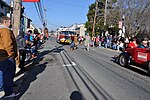Indian Queen Tavern and Black's Store
Buildings and structures in Cecil County, MarylandCecil County, Maryland geography stubsCommercial buildings completed in 1755Commercial buildings on the National Register of Historic Places in MarylandDrinking establishments on the National Register of Historic Places in Maryland ... and 8 more
Eastern Shore, Maryland Registered Historic Place stubsHistoric American Buildings Survey in MarylandHotel buildings on the National Register of Historic Places in MarylandHotels in MarylandMaryland stubsNational Register of Historic Places in Cecil County, MarylandTaverns in MarylandUnited States hotel stubs

Indian Queen Tavern and Black's Store is a historic hotel and store complex located at Charlestown, Cecil County, Maryland, USA. It consists of two mid-18th century structures: Black's Store, originally the Red Lyon Inn, and the Indian Queen Tavern, later called Hotel. The two taverns and their remaining outbuildings form a court. The outbuildings include a log kitchen with a loft and a two-story smokehouse.It was listed on the National Register of Historic Places in 1975.
Excerpt from the Wikipedia article Indian Queen Tavern and Black's Store (License: CC BY-SA 3.0, Authors, Images).Indian Queen Tavern and Black's Store
Market Street,
Geographical coordinates (GPS) Address Phone number Nearby Places Show on map
Geographical coordinates (GPS)
| Latitude | Longitude |
|---|---|
| N 39.574166666667 ° | E -75.9775 ° |
Address
Market Street Café
Market Street 315
21914
Maryland, United States
Open on Google Maps







